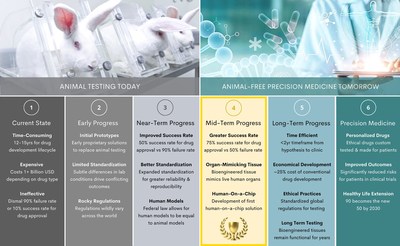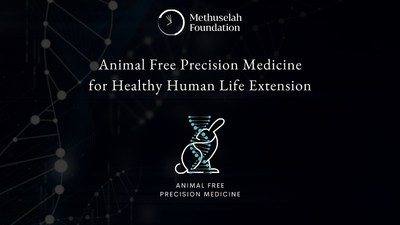Goal: Replace unreliable animal research with more precise test technology to speed development of effective new drugs and therapies
DUBLIN, Sept. 20, 2022 /PRNewswire/ — Methuselah Foundation, the original biomedical charity devoted to extending the human health span, announced a $1 million competition to encourage innovation that will enable medicine to move away from unreliable animal testing.
Though medicine relies heavily on animal testing for the development of new drugs and therapies, it is unreliable, ineffective and costly.
Because many human diseases cannot be reproduced in animals, 90% of drugs found safe and effective in animal tests fail during human clinical trials. The time-consuming nature of animal testing also contributes to the high cost of producing new drugs. Today, development of a new oncology drug can cost up to $5 billion and take up to 15 years.
“Society can no longer afford the time and cost of bringing new drugs to market by relying on traditional animal testing, particularly as we are poised to make broad use of precision medicine to more effectively treat patients,” said David Gobel, Methuselah Foundation co-founder and CEO. “We must accelerate use of bioprinted human tissue to eliminate the harm to animals and humans, improve clinical accuracy and speed our ability to deliver the best patient outcomes.”
Bioprinted human tissue can provide human-equivalent measurements required by the FDA for new drug trials. Because it uses bioengineered human tissue, it promises to be a superior alternative to animal testing for research, clinical trials and precision medicine.
To encourage the development of bioprinted human tissue – often called organs on a chip – Gobel announced the Animal Free Precision Medicine Innovation Prize, a $1 million challenge to normalize the use of bioengineered tissue that mimics live human organs and develop the first “body-on-a-chip” solution that can be used to develop drugs. Winning entries must drive a 75% success rate for drug approvals, vs. the current 10% rate.
Anthony Atala, M.D., a leader in the field of organ printing and founding director of the Wake Forest Institute for Regenerative Medicine at the Wake Forest School of Medicine, said the need is great for a superior alternative to animal testing.
“For many years, we at Wake Forest have been aware of the severe limitations of animal testing and how inadequate it is for personalized medicine,” he said. “I am excited to support this Animal Free Precision Medicine initiative and the incentives it creates to accelerate this new era of medical research.”
Gobel announced the Prize at Longevity Summit Dublin, the world’s first gathering of leading longevity entrepreneurs, biotech companies, researchers and investors.
Methuselah Foundation is a biomedical charity established in 2001, and named after Methuselah, the grandfather of Noah in the Hebrew Bible, whose lifespan was recorded as 969 years. The Foundation’s mission is to make age 90 the new 50 by 2030. The organization has funded independent longevity research, underwritten several international competitions aimed at promoting scientific breakthroughs, financed dozens of companies and initiatives developing products to extend the healthy human lifespan and created or sponsored four other foundations and venture funds to promote the mission of extending healthy life. For more information, visit the Foundation website, or check it out on Twitter, Facebook, Instagram or LinkedIn.
For more information, contact:
Florina Gobel, Methuselah Foundation
344994@email4pr.com
(206) 643-8175
or
Jim Martinez, rightstorygroup
344994@email4pr.com
(312) 543-9026
SOURCE Methuselah Foundation



